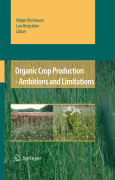
Many people believe that organic agriculture is a solution for various problems related to food production. Organic agriculture is supposed to produce healthier products, does not pollute the environment, improves the fertility of soils, saves fossil fuels and enables high biodiversity. This book has been written to provide scientifically based information on organic agriculture such ascrop yields, food safety, nutrient use efficiency, leaching, long-term sustainability, greenhouse gas emissions and energy aspects. A number of scientists working with questions related to organic agriculture were invited to present the most recent research and to address critical issues. An unbiased selectionof literature, facts rather than standpoints, and scientifically-based examinations instead of wishful thinking will help the reader be aware of difficulties involved with organic agriculture. Contains a thorough and critical evaluation of various aspects of organic crop production Provides the reader with a state-of-the-art view on advantages and disadvantages of organic agriculture INDICE: Preface. 1. Widespread opinions about Organic Agriculture – Are they supported by scientific evidence? 2. Fundamentals of Organic Agriculture – Past and Present. 3. Can organic crop production feed the world? 4. Plant nutrients in organic farming. 5. Nutrient supply in organic agriculture – plant availability, sources and recycling. 6. Synthesis of the Apelsvoll cropping system experiment in Norway – Nutrient balance, use efficiency and leaching. 7. Use efficiency and leaching of nutrients in organic and conventional cropping systems in Sweden. 8. How will conversion to organic cereal production affect carbon stocks in Swedish agricultural soils? 9. Energy analysis of organic and conventional agricultural systems. 10. The role of arbuscular mycorrhizas in organic farming. 11. Organic food production and its influence on naturally occurring toxins.
- ISBN: 978-1-4020-9315-9
- Editorial: Springer
- Encuadernacion: Cartoné
- Páginas: 240
- Fecha Publicación: 01/01/2009
- Nº Volúmenes: 1
- Idioma: Inglés
